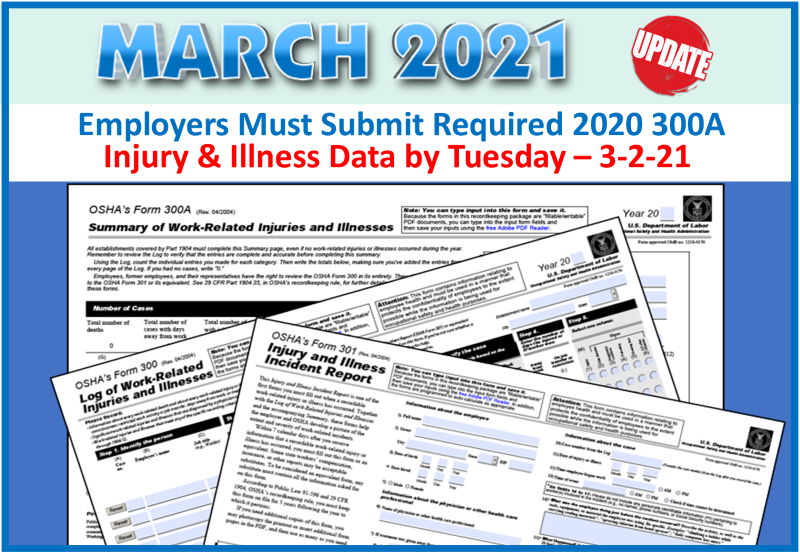Employers Must Submit the Form Electronically by 3-2-21
- Electronic submissions are required by firms with 250+ employees (currently required to keep OSHA injury and illness records)
- Establishments with 20-249 employees classified in specific industries with historically high rates of occupational injuries and illnesses.
Click: For a complete list of types of employers with 20-249 employees must file these on-line reports,
Questions or Assistance? Contact Us For The Answers

CA Supreme Court Rejects Meal Period Rounding Policies Use
 On 2-24-21 the CA Supreme Court held that employers cannot use the practice of rounding time punches in the meal period context, and that “un-rounded” time records that show non-compliant meal periods raise a rebuttable presumption of meal period violations, including at the summary judgment stage. Donohue v. AMN Services, LLC, No. S253677.
On 2-24-21 the CA Supreme Court held that employers cannot use the practice of rounding time punches in the meal period context, and that “un-rounded” time records that show non-compliant meal periods raise a rebuttable presumption of meal period violations, including at the summary judgment stage. Donohue v. AMN Services, LLC, No. S253677.The case involved a healthcare services and staffing company that used an electronic timekeeping system that rounded time punches to the nearest 10-minute increment. This rounding occurred for both the employees time punch at the start/end of their shift and the start/end of any meal period. The plaintiff, a former employee, filed a class action lawsuit alleging that AMN improperly rounded time punches for meal periods and, thus, failed to pay premium wages for non-compliant meal periods, among other claims.
The trial court and the Court of Appeal affirmed, agreeing that rounding meal period time punches was not prohibited by the plain text of the CA Labor Code or the relevant Industrial Welfare Commission Wage Order, and that AMN’s rounding policy was neutral on its face and as applied, as required by California Law. The CA Supreme Court granted review and reversed the judgment of the Court of Appeal. The court considered two questions:
- Whether an employer may properly round time punches for meal periods
- Whether time records showing non-compliant meal periods raise a rebuttable presumption for meal period violations.
First: The court explained that the Labor Code and the relevant Wage Order confirm that rounding is inappropriate in the meal period context because the meal period provisions are designed to prevent even minor infringements on meal period requirements, and rounding is incompatible with that objective as demonstrated by the fact that an employee receives the full amount of premium pay regardless of whether the meal period was short, late, or not provided at all.
Second: The court noted that even relatively minor infringements on meal periods can cause substantial burdens to the employee and that within a 30-minute timeframe, a few minutes can make a significant difference. Finally, the court rejected AMN’s neutral application argument because, while counting slightly fewer minutes one day can be made up by counting a few more minutes another day for the purposes of regular wages, a shorter or delayed meal period one day cannot be offset by a longer or earlier meal period another day, especially when taking into account the premium pay that is triggered for even minor meal period infractions. Here, the court highlighted that the policy never provides employees with premium pay when such pay is not owed, and does not always trigger premium pay when such pay is owed.
What Employers Should Know
This decision will have a significant impact on how employers are expected to document an employee’s meal periods and time worked.
First: The court made clear that employers may not use rounded time for meal periods, so employers utilizing such practices should adjust their record-keeping practices to eliminate any rounding of meal period punch times.
Second: While this rule affirmed that an employer does not have to police meal periods and only has to provide the opportunity to take compliant meal periods, and places the onus on employers to track when and why an employee’s meal period was missed, short, or late. Employers should evaluate their timekeeping policies and capabilities to see what, if anything, can be done to track this information in order to rebut the “presumption” created by technically non-complaint meal periods.

